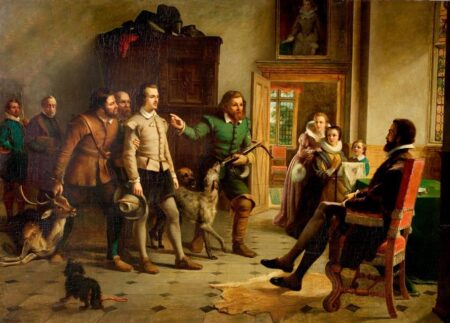Table of Contents
ToggleIntroduction
William Shakespeare, often called England’s national poet, is widely regarded as the greatest playwright and writer in the English language. His works have been translated into every major language and are performed more often than those of any other playwright. But who was William Shakespeare, and how did he come to have such a profound impact on literature and culture?

Early Life
William Shakespeare was born on April 23, 1564, in the small town of Stratford-upon-Avon, England. He was the third of eight children born to John Shakespeare, a glove-maker, and Mary Arden, the daughter of a wealthy landowner. Not much is known about Shakespeare’s early life, but he likely attended the local grammar school, where he would have received a solid education in Latin and the classics.

PHOTO: THE ROYAL SHAKESPARE COMPANY
Marriage and Family
At the age of 18, Shakespeare married Anne Hathaway, who was eight years his senior. The couple had three children: Susanna, and twins Hamnet and Judith. Unfortunately, Hamnet died at the age of 11, a loss that may have deeply affected Shakespeare and possibly influenced his later works.

PHOTO: AGECROFT HALL
Career in London
In the late 1580s, Shakespeare moved to London, leaving his family behind in Stratford. It was in London that he began his career as an actor, playwright, and eventually a part-owner of the Lord Chamberlain’s Men, later known as the King’s Men, one of the most successful acting companies of the time.
Shakespeare quickly gained popularity as a playwright. His early works, such as “Romeo and Juliet,” “A Midsummer Night’s Dream,” and “Richard III,” showcased his unique ability to blend dramatic plots with poetic language. His plays covered a wide range of genres, including comedies, tragedies, and histories, appealing to audiences from all walks of life.

PHOTO : WIKIPEDIA
Major Works
Shakespeare’s body of work includes 39 plays, 154 sonnets, and several poems. Some of his most famous works include:
-
“Hamlet”: A tragedy that explores themes of revenge, madness, and the complexities of human nature.
-
“Macbeth”: A dark tale of ambition and power, showcasing the consequences of moral corruption.
-
“Othello”: A story of jealousy and betrayal, highlighting the destructive power of these emotions.
-
“King Lear”: A tragic exploration of family, loyalty, and the consequences of pride.
-
“The Tempest”: A play that blends magic, romance, and redemption on a mysterious island.
Shakespeare’s sonnets, which explore themes of love, time, and beauty, are also celebrated for their deep emotional resonance and masterful use of language.

PHOTO : LEVERAGE EDU

